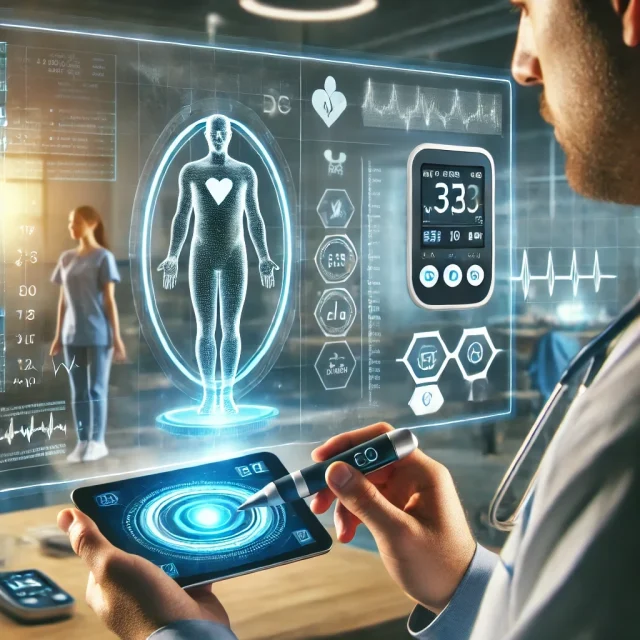
Introduction
Diabetes management has evolved dramatically with the integration of health tech, offering clinicians and healthcare professionals advanced tools to enhance patient care. From continuous glucose monitoring (CGM) systems to AI-driven insulin delivery, these advancements help improve outcomes and streamline workflows. But what are the latest innovations making waves in diabetes technology? Let’s explore the most significant breakthroughs shaping the future of diabetes care.
Table of Contents
Smart Continuous Glucose Monitoring (CGM) Systems
AI-Powered Insulin Delivery and Decision Support Tools
Digital Therapeutics and Mobile Apps for Diabetes Management
Wearable Technology and Remote Monitoring
Conclusion
FAQs
Smart Continuous Glucose Monitoring (CGM) Systems
Continuous glucose monitors have revolutionized diabetes care by providing real-time glucose readings, reducing the reliance on fingerstick testing. The latest health tech advancements in CGM include:
Improved accuracy and longevity: Next-generation CGMs, such as the Dexcom G7 and FreeStyle Libre 3, offer better sensor accuracy and extended wear time.
Integration with insulin pumps: Hybrid closed-loop systems now combine CGM data with insulin pump technology to automate insulin delivery, reducing the risk of hypoglycemia.
Remote monitoring capabilities: Clinicians can access patient glucose data via cloud-based platforms, improving telemedicine consultations and proactive interventions.
By leveraging CGM data, healthcare providers can personalize treatment plans, reduce hospital admissions, and enhance overall patient adherence.
AI-Powered Insulin Delivery and Decision Support Tools
Artificial intelligence (AI) is playing a crucial role in optimizing insulin therapy. AI-driven insulin delivery systems analyze glucose trends and automatically adjust insulin doses, reducing manual calculations and errors. Key innovations include:
Automated insulin pumps: The Tandem t:slim X2 with Control-IQ technology utilizes machine learning to predict and adjust insulin dosing.
AI-powered decision support tools: Apps like DreaMed Advisor provide real-time insulin recommendations based on patient data.
Predictive analytics: Advanced algorithms help anticipate glucose fluctuations, allowing preemptive adjustments to prevent hyperglycemia or hypoglycemia.
By integrating AI-driven solutions, clinicians can offer more precise, data-informed insulin therapy, improving patient outcomes and reducing diabetes-related complications.
Digital Therapeutics and Mobile Apps for Diabetes Management
Digital therapeutics (DTx) are software-based interventions designed to support diabetes management through behavior modification and patient education. Several mobile apps now offer:
Personalized coaching: Apps like mySugr and BlueLoop provide tailored recommendations based on individual glucose patterns.
Gamification for engagement: Programs such as One Drop encourage adherence through interactive challenges and rewards.
Remote patient monitoring: Platforms like Glooko sync with CGMs and insulin pumps, allowing clinicians to track patient data remotely.
With health tech-enabled digital therapeutics, patients gain access to real-time feedback and structured guidance, leading to improved self-management and glycemic control.
Wearable Technology and Remote Monitoring
Wearable devices are playing an increasing role in diabetes care, offering patients and clinicians continuous health insights beyond glucose monitoring. The latest innovations include:
Smartwatches with glucose tracking: Companies like Apple and Fitbit are exploring non-invasive glucose monitoring through wearable sensors.
Smart insulin pens: The InPen records insulin doses and connects with mobile apps for dose tracking and reminders.
Remote patient monitoring platforms: Systems like Teladoc Health and Omada Health enable clinicians to monitor patient vitals and intervene when necessary.
These health tech solutions empower patients with real-time data while allowing healthcare providers to deliver more proactive and personalized care.
Conclusion
Advancements in health tech are transforming diabetes care, offering clinicians innovative tools to optimize treatment, enhance patient engagement, and improve outcomes. From AI-powered insulin delivery to smart wearables and digital therapeutics, these breakthroughs pave the way for a more efficient and personalized approach to diabetes management.
FAQs
1. How do CGM systems improve diabetes management? CGMs provide real-time glucose readings, reducing the need for fingerstick testing and helping patients and clinicians make data-driven decisions to maintain stable glucose levels.
2. What are the benefits of AI-powered insulin pumps? AI-driven pumps adjust insulin delivery based on glucose trends, reducing manual calculations, minimizing hypoglycemia risks, and improving glycemic control.
3. Are digital therapeutics effective for diabetes management? Yes, digital therapeutics offer personalized coaching, real-time feedback, and gamification strategies that enhance patient adherence and self-management.
4. Can wearable technology help with diabetes monitoring? Yes, wearables like smartwatches, smart insulin pens, and remote monitoring systems provide continuous health insights, enabling proactive diabetes management.
5. Where can patients find additional diabetes support and resources? Patients can explore online forums like Health Healing Well for community support and expert guidance.
This content is not medical advice. For any health issues, always consult a healthcare professional. In an emergency, call 911 or your local emergency services